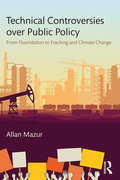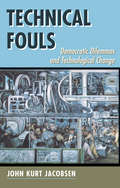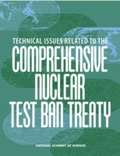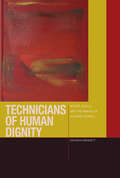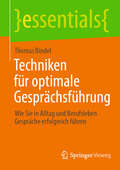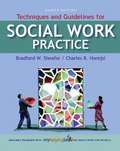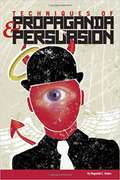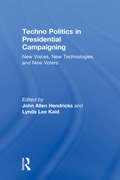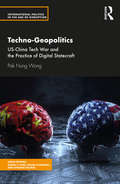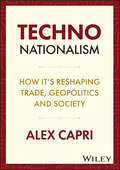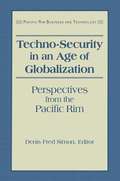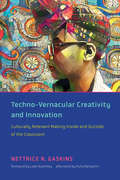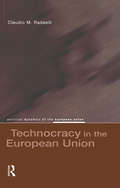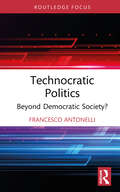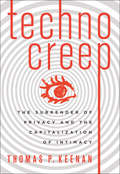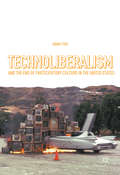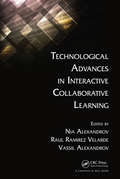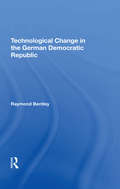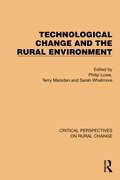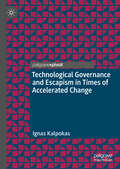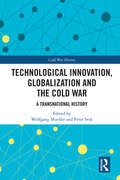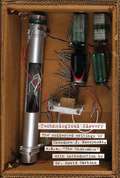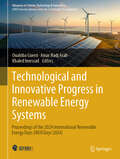- Table View
- List View
Technical Controversies over Public Policy: From Fluoridation to Fracking and Climate Change
by Allan MazurNewspapers and TV often report controversial risk warnings over technological innovations, scientific developments, or environmental hazards that have at their core a dispute between experts who contradict one another not only on preferred policy but also on the scientific facts that underlie decisions about public policy. Recent examples are the disputes about climate change, fracking, vaccination and autism, and genetically modified organisms (GMOs). Adversaries mobilize constituents with similar interests or ideologies, form opposing coalitions, and compete for media exposure. They articulate arguments and counterarguments. "Facts" become malleable, differently appraised by each side. Uncongenial evidence is ignored or discredited. For many adversaries, winning the policy argument is primary; evaluating the true degree of hazard is secondary. How can we determine which side’s "facts" are right and which wrong? Do news media enlighten the public or worsen polarization? Can policymakers deal with controversial science and technology more cogently than they do now?
Technical Fouls: Democracy And Technological Change
by John Kurt JacobsenWhat is it that shapes the direction of technological progress in advanced industrial societies? Is it science? Technology itself? Or is it something even more powerful and all-encompassing, like power or money or politics? John Kurt Jacobsen addresses this topic by investigating how contemporary democratic capitalist states govern the development and deployment of their scientific and technological resources. He examines the interaction of ideology, profits, and power, and their combined effect upon technology policy in democracies.The ?social function of science? has been a contentious area of scholarly study throughout the second half of the twentieth century. Although the book focuses mainly on the United States, for the sake of instructive comparison, it also studies technological development of other societies, including the former Soviet Union and China. Some competing accounts of technical change across the borders include laissez faire, cultural, and neo-Marxist markets. In fact, with regard to laissez faire markets, even to inquire if science has a social function is to deviate from the appropriate images of economic development. What is always politically at stake is who will rule the next stage in production due to each swing in technology, which will, in turn, be associated with a new structure of control. Most recently, the microchip revolution and cyberspace are the most highly publicized candidates for the next upswing in technology?and thus the next new structure of control.The explanatory focus of the book is on ideology, or on ideas about how technology works and should work, and the three key areas of policy contention discussed are industrial development, military uses, and the environment. Students and scholars of science, technology, and sociology should find this book useful in coming to terms with the fundamental questions underlying the development of technology today.
Technical Issues Related To The Comprehensive Nuclear Test Ban Treaty
by Committee on Technical Issues Related to Ratification of the Comprehensive Nuclear Test Ban TreatyDrawing upon the considerable existing body of technical material related to the Comprehensive Test Ban Treaty, the National Academy of Sciences reviewed and assessed the key technical issues that arose during the Senate debate over treaty ratification. In particular, these include: (1) the capacity of the United States to maintain confidence in the safety and reliability of its nuclear stockpile in the absence of nuclear testing; (2) the nuclear-test detection capabilities of the international monitoring system (with and without augmentation by national systems and instrumentation in use for scientific purposes, and taking into account the possibilities for decoupling nuclear explosions from surrounding geologic media); and (3) the additions to their nuclear-weapons capabilities that other countries could achieve through nuclear testing at yield levels that might escape detection, and the effect of such additions on the security of the United States.
Technicians of Human Dignity: Bodies, Souls, and the Making of Intrinsic Worth (Just Ideas)
by Gaymon BennettTechnicians of Human Dignity traces the extraordinary rise of human dignity as a defining concern of religious, political, and bioethical institutions over the last half century and offers original insight into how human dignity has become threatened by its own success. The global expansion of dignitarian politics has left dignity without a stable set of meanings or referents, unsettling contemporary economies of life and power.Engaging anthropology, theology, and bioethics, Bennett grapples with contemporary efforts to mobilize human dignity as a counter-response to the biopolitics of the human body, and the breakdowns this has generated. To do this, he investigates how actors in pivotal institutions —the Vatican, the United Nations, U.S. Federal Bioethics—reconceived human dignity as the bearer of intrinsic worth, only to become frustrated by the Sisyphean struggle of turning its conceptions into practice.
Techniken für optimale Gesprächsführung: Wie Sie in Alltag und Berufsleben Gespräche erfolgreich führen (essentials)
by Thomas BindelThomas Bindel schlägt Ihnen vor, mit welchen Worten Sie in schwierigen Situationen richtig reagieren. Er verrät Ihnen, mit welcher Systematik Sie Gespräche und Verhandlungen perfekt vorbereiten. Und er zeigt Ihnen, wie Sie mit Menschen vertieft ins Gespräch kommen, indem Sie besser zuhören und treffende Fragen stellen. Das vorliegende Buch bietet somit ein Konzentrat aus den wichtigsten Methoden, um Gespräche optimal führen zu können: Ausgestattet mit dem Erfolgsprinzip eines amerikanischen Präsidenten, diversen Denkhüten, passenden Strategien und Techniken für Gesprächsvorbereitung, -führung sowie -nachbereitung übersteht man die Begegnung mit dem Freud&’schen Eisberg und findet so zu einer Kommunikation, die durch ein Quadrat runder läuft und gewaltfrei mehr erreicht.
Techniques and Guidelines for Social Work Practice (8th edition)
by Bradford W. Sheafor Charles R. HorejsiFocusing on the specific guidelines social workers use everyday, this textbook describes 157 techniques for communicating effectively, managing workload, serving vulnerable client populations, and practicing each phase of the planned change process.
Techniques of Propaganda and Persuasion
by Magedah E. ShaboTechniques Of Propaganda and Persuasion Expand your students' critical thinking skills with this introduction to some of the most popular techniques and uses of propaganda. With more than 100 classic illustrations and examples, this book will teach readers to recognize propaganda in many forms. Each chapter includes end-of-unit discussion questions that will spark conversations in any classroom.
Techno Politics in Presidential Campaigning: New Voices, New Technologies, and New Voters
by John Allen Hendricks Lynda Lee KaidThe 2008 US presidential campaign saw politicians utilizing all types of new media -- Facebook, MySpace, YouTube, Twitter, e-mail, and cell phone texting – to reach voters of all ages, ethnicities, socio-economic backgrounds, and sexual orientations. This volume examines the use of these media and considers the effectiveness of reaching voters through these channels. It explores not only the use of new media and technologies but also the role these tactics played in attracting new voters and communicating with the electorate during the 2008 presidential debates. Chapters focus on how the technologies were used by candidates, the press, and voters.
Techno-Geopolitics: US-China Tech War and the Practice of Digital Statecraft (International Politics in the Age of Disruption)
by Pak Nung WongTechno-Geopolitics explores contemporary US-China relations and the future of global cyber-security through the prisms of geopolitics and financial-technological competition. It puts forward a new conceptual framework for an emerging field of digital statecraft and discusses a range of key issues including the controversies around 5G technology, policy regulations over TikTok and WeChat, the emergence of non-traditional espionage, and potential trends in post-pandemic foreign policy. Analysing the ramifications of the ongoing US-China trade standoff, this book maps the terrain of technological war and the race for global technological leadership and economic supremacy. It shows how China’s technological advancements have not only been the key to its national economic development but have also been the core focus of US intelligence. Further, it draws on US-China counter-intelligence cases sourced from the US Department of Justice and Federal Bureau of Investigation (FBI) to explore emerging patterns and techniques of China’s espionage practice. A cutting-edge study on the future of statecraft, this volume will be of great interest to scholars and researchers of international relations, security and intelligence studies, information technology and artificial intelligence, political science, especially US foreign policy and China studies. It will also be of great interest to policymakers, career bureaucrats, security and intelligence practitioners, technology regulators, and professionals working with think tanks and embassies.
Techno-Nationalism: How It's Reshaping Trade, Geopolitics and Society
by Alex CapriThe essential book on technology-related competition between nations and its impact on the world Nations have long sought to use technology as a power-multiplier for their own ambitions. In the twenty-first century, at a time of unprecedented innovation, the United States and China are in a race to achieve technological superiority. But how will this affect long-standing trade ties and the international landscape? Techno-nationalism holds that a nation’s economic strength and its national security — even its social stability— are linked to the technological prowess of its institutions and enterprises. From artificial intelligence and biotechnology to semiconductors and quantum science, nations that fall behind in the technology race risk becoming permanent losers, with potentially catastrophic consequences. After decades of trade liberalization and free-flowing investment into China, a paradigm shift amongst a bloc of like-minded, mostly Western countries, has set in motion epic change. Techno-nationalism is reorganizing the global economy. Alex Capri, who spent decades as a trade and supply chain professional in China and throughout the world, lays out the dynamics of this change and its underlying themes, from the paradox facing U.S.-China commercial linkages to the grey zones in which states and firms must now try to coexist. He provides a realist’s perspective of both the challenges and opportunities facing international actors. Regarding the elements of techno-nationalism, Capri paints a masterful picture of the strategic decoupling of supply chains and the re-shoring of key manufacturing ecosystems such as semiconductors. He provides an illuminating account of the geopolitics of data, and the fragmentation of the digital landscape, as well as the bifurcation of financial markets, academia, and R&D around Chinese and American spheres of influence. These themes carry through to Capri’s fascinating accounts of the modern-day space-race, and space-based Internet, undersea cables, hypersonic warfare, the AI arms race, drones, and robotics. The book’s clear explanations of semiconductors and their importance is highly useful. TECHNO-Nationalism is a must-read for business and government leaders, investors and strategists, academics, journalists, NGOs, or anyone who wants to experience a thoroughly entertaining and educational account of one the most important issues of our time.
Techno-Security in an Age of Globalization: Perspectives from the Pacific Rim (Pacific Rim Business And Technology Ser.)
by Denis Fred SimonThis text assesses the changing dimensions of national security in a world where business and technology issues have moved to centre stage, and traditional military security issues seem to have receded due to the end of the Cold War.
Techno-Vernacular Creativity and Innovation: Culturally Relevant Making Inside and Outside of the Classroom
by Nettrice R. GaskinsA novel approach to STEAM learning that engages students from historically marginalized communities in culturally relevant and inclusive maker education.The growing maker movement in education has become an integral part of both STEM and STEAM learning, tapping into the natural DIY inclinations of creative people as well as the educational power of inventing or making things. And yet African American, Latino/a American, and Indigenous people are underrepresented in maker culture and education. In this book, Nettrice Gaskins proposes a novel approach to STEAM learning that engages students from historically marginalized communities in culturally relevant and inclusive maker education. Techno-vernacular creativity (TVC) connects technical literacy, equity, and culture, encompassing creative innovations produced by ethnic groups that are often overlooked.TVC uses three main modes of activity: reappropriation, remixing, and improvisation. Gaskins looks at each of the three modes in turn, guiding readers from research into practice. Drawing on real-world examples, she shows how TVC creates dynamic learning environments where underrepresented ethnic students feel that they belong. Students who remix computationally, for instance, have larger toolkits of computational skills with which to connect cultural practices to STEAM subjects; reappropriation offers a way to navigate cultural repertoires; improvisation is firmly rooted in cultural and creative practices. Finally, Gaskins explores an equity-oriented approach that makes a distinction between conventional or dominant pedagogical approaches and culturally relevant or responsive making methods and practices. She describes TVC habits of mind and suggests methods of instructions and projects.
Technocracy and Democracy in Latin America
by Eduardo DargentTechnocracy and Democracy in Latin America: The Experts Running Government
Technocracy in the European Union (Political Dynamics of the European Union)
by Claudio M. RadaelliOne of the most common and strongest criticisms of the EU is that power is held by a select few who are unaccountable technocrats sitting in Brussels who without consultation formulate policies.A fresh and innovative new series, written by leading authorities, providing students and researchers with a concise analysis of key topics relating to the state of the European Union and its future development. Combining insights from the theoretical literature with brief institutional descriptions, each book in the series focuses on the key questions, 'Where does power lie?', 'What are the likely scenarios for development?', thereby enabling the reader to gain a better sense of the dynamic processes of politics at EU level.
Technocratic Politics: Beyond Democratic Society? (Routledge Studies in Political Sociology)
by Francesco AntonelliThis book considers the role of experts and expertise in contemporary politics and the ways in which digitalisation and the use of technique are transforming practices of governance. Asking whether the Covid-19 crisis is likely to further advance or weaken these processes, it examines their impact on the future of democracy and urges rejection of the idea of technocracy as an alternative to politics. An examination of the relationship between social elites and technique, this volume highlights the threat posed to representative democracy of this fundamental mechanism of governance in the global world and reflects upon new forms of the political-economic regime. It is important reading for scholars of sociology and politics with interests in questions of power, governance, and representation.
Technocreep
by Thomas P. Keenan"Technology is rapidly moving into our bodies," writes cyber expert Keenan, "and this book gives a chilling look ahead into where that road may lead us - on a one way trip to the total surrender of privacy and the commoditization of intimacy." Here is the definitive dissection of privacy-eroding and life-invading technologies, coming at you from governments, corporations, and the person next door.Take, for example, "Girls Around Me": a Russian-made iPhone App that allowed anyone to scan the immediate vicinity for girls and women who checked in on Foursquare and had poorly secured Facebook profiles. It combined this information in a way never intended by the original poster. Going to a Disney theme park? Your creepy new "MagicBand" will alert Minnie Mouse that you're on the way and she'll know your kid's name when you approach her. Thinking about sending your DNA off to Ancestry.com for some "genetic genealogy"? Perhaps you should think again: your genetic information could be used against you.With security scares like the Heartbleed bug (which compromised even supposedly safe internet behemoths like Google and Yahoo!) becoming more commonplace, this book is a must-read for anybody who values their privacy in a wired world.
Technoliberalism and the End of Participatory Culture in the United States
by Adam FishThis book examines whether television can be used as a tool not just for capitalism, but for democracy. Throughout television's history, activists have attempted to access it for that very reason. New technologies provided brief openings, but these were often short-lived. This book elaborate on this history by using ethnographic data upon a new iteration of liberalism, technoliberalism, which sees Silicon Valley technology and the free market of Hollywood end the need for a politics of participation.
Technological Advances in Interactive Collaborative Learning
by Nia Alexandrov Raul Ramirez Velarde Vassil AlexandrovExploring the latest developments in the technology and pedagogy of higher education, Technological Advances in Interactive Collaborative Learning presents information technology-oriented educational programs for the next generation of scientists and researchers. It highlights the importance of technology, pedagogy, and management in the higher edu
Technological Change In The German Democratic Republic
by Raymond BentleyFocusing on East Germany’s capacity to innovate and diffuse technology, this book sheds light on the technological gap that has developed between the two Germanies. Dr. Bentley compares the sophistication of GDR and FRG technology in different industrial branches, evaluates the strengths and weaknesses of the GDR’s research and development system, compares the R&D effort of the two Germanies, and discusses the government policies that affected technological change in GDR industry from 1945 to 1975. He identifies and analyzes hindrances to research, innovation, and diffusion in the fields of planning, organization, economic stimulation, and ideology, and looks at the formation of interest groups. He also compares evidence from the GDR with data from other countries, including the USSR.
Technological Change and the Rural Environment (Critical Perspectives on Rural Change #2)
by Sarah Whatmore Philip Lowe Terry MarsdenOriginally published in 1990, this volume addresses issues surrounding global ecological changes and sustainability of present patterns of urbanisation and industrialisation. The book discusses these problems and other issues such as how rural environments in many developed and developing countries have been transformed by a technological revolution. Looking at a diverse range of topics from climate change to slurry pollution and the destruction of genetic resources to the risks of biotechnology, this volume addresses these issues which concern the dynamics and social relations of technological change in rural areas.
Technological Governance and Escapism in Times of Accelerated Change (Information Technology and Global Governance)
by Ignas KalpokasThis book examines escapist coping strategies brought about by the pace, breadth and governance of technological change. It argues that escapism manifests in various forms, ranging from nostalgia for a fantasised past of unhindered reason and agency, to progressive visions of societal and political improvement, and greater empowerment. Drawing on post-humanist theory and critical disability studies, the book also assesses how escapism should not be viewed as an unavoidable reaction to technological change, and develops a model for an ethically equitable relationship between humans and technology. It will appeal to all those interested in governance and politics, media and communication studies, technology studies, and philosophy.
Technological Innovation, Globalization and the Cold War: A Transnational History (Cold War History)
by Wolfgang Mueller Peter SvikThis volume focuses on the interconnections between the Cold War, technological innovation and globalization. Although the consequences of globalization have received ample attention in both academia and the public discourse, only limited attention has so far been given to the factors that instigated various waves of this process. This holds particularly true for the period following World War II, during which a struggle between the two global blocs fanned not only technological innovations but also their transfer. This volume is dedicated to examining the links between the Cold War and this phase in the history of globalization, a phase that gradually made the world—despite high levels of international tension—more and more inter-related. More specifically, it anchors a very contemporary phenomenon to its historical context and pinpoints how the varied and multi-layered East-West interactions helped to induce and foster the globalization processes. Emphasizing technology and its cross-bloc flows, as well as several levels of actors, including states, private companies, and individuals, this volume reflects an important shift towards "transnationalism" which has occurred in the historiography in the recent years. This book will be of interest to students of Cold War Studies, science and technology studies, and International Relations.
Technological Slavery
by Theodore J. Kaczynski David Skrbina"Like many of my colleagues, I felt that I could easily have been the Unabomber's next target. He is clearly a Luddite, but simply saying this does not dismiss his argument. . . . As difficult as it is for me to acknowledge, I saw some merit in the reasoning in [Kaczynski's writing]. I started showing friends the Kaczynski quote from Ray Kurzweil's The Age of Spiritual Machines; I would hand them Kurzweil's book, let them read the quote, and then watch their reaction as they discovered who had written it." -- Bill Joy, founder of Sun Microsystems, in "Why the Future Doesn't Need Us," Wired magazineTheodore J. Kaczynski has been convicted for illegally transporting, mailing, and using bombs, resulting in the deaths of three people. He is now serving a life sentence in the supermax prison in Florence, Colorado.The ideas and views expressed by Kaczynski before and after his capture raise crucial issues concerning the evolution and future of our society. For the first time, the reader will have access to an uncensored personal account of his anti-technology philosophy, which goes far beyond Unabomber pop culture mythology.Feral House does not support or justify Kaczynski's crimes, nor does the author receive royalties or compensation for this book. It is this publisher's mission, as well as a foundation of the First Amendment, to allow the reader the ability to discern the value of any document.David Skrbina, who wrote the introduction, teaches philosophy at the University of Michigan, Dearborn.
Technological and Innovative Progress in Renewable Energy Systems: Proceedings of the 2024 International Renewable Energy Days (IREN Days'2024). (Advances in Science, Technology & Innovation)
by Ouahiba Guerri Amar Hadj Arab Khaled ImessadThis book is the proceedings of the papers presented during the International Renewable Energy Days on May 28–30, 2024, in Algiers (IrenDays’2024). It provides a comprehensive and current overview in the field of renewable energies and their role in promoting a sustainable world. Whether solar, wind, hydrogen, biomass or bioenergy, this book covers a wide range of topics including resource assessment and forecasting, energy conversion and efficiency, renewable grid integration, innovative technologies and new materials, energy efficiency in buildings, energy storage, sustainable hydrogen, alternative fuels, desalination and water treatment, as well as energy policy and economic aspects of renewable energy. Including the latest research studies on renewable energy, this book presents a review of recent developments in renewable energy systems and their applications, along with the challenges to their widespread use. Furthermore, this book includes suggestions resulting from discussions at roundtables on “Innovation in Renewable Energy: Strategy and Standards” and “Artificial Intelligence for Renewable Energy Systems.” This book is aimed at researchers, scientists and postgraduate students as it provides an in-depth overview of the most recent advances in the field of renewable energy and sustainable development. It could serve as a guide for industrialists and policy makers in emerging countries, as it provides best practices in the renewable energy sector and suggests the development of a renewable energy strategy. This book not only informs but also can contribute to a greener planet and a sustainability-oriented future.
Technologie, sozialer Wandel und menschliches Verhalten: Einfluss für Wirkung
by Cornelia C. WaltherDieses Buch befasst sich mit dem organischen Kontinuum, das Individuen, Gemeinschaften und die Gesellschaft miteinander verbindet. Ein Überblick über Aspirationelle Algorithmen (AA) und Wertvolle Werkzeuge (WW) illustriert den möglichen Nutzen von Technologie, um einen bewussten Übergang einzuleiten, vom KI-Kult zur Kultivierung von Höherer Humanität (HH). Die menschliche Einstellung, die hinter dem Design und der Nutzung von Technologie steht, bestimmt die Ergebnisse der Technologie. Wenn das angestrebte Ergebnis das Gemeinwohl ist, dann muss das vorausgehende menschliche Streben auf dieses Ziel ausgerichtet sein. Nur eine Technologie, die mit dem Ziel konzipiert wurde, eine Gesellschaft zu schaffen die den Einzelnen zur Entfaltung seines Potenzials befähigt, wirkt sich positiv auf das Gemeinwohl aus. Angesichts des ständigen Wechselspiels zwischen den vier Dimensionen der menschlichen Existenz - Seele, Herz, Verstand, Körper -, die sich in Form von Bestrebungen, Emotionen, Gedanken und Empfindungen ausdrücken, wird deutlich, wie Technologie dazu dienen kann, den Einzelnen systematisch von der Inspiration zum Wunsch, von der Information zur Zündung einer spürbaren Veränderung zu führen. Dieses Buch erklärt den Übergang entlang einer multidimensionalen Einfluss Skala. Zwei sich gegenseitig beeinflussende Dynamiken werden analysiert: erstens der Einfluss von Werten und Bestrebungen auf die Wirkung von Technologie und zweitens der Einfluss von Technologie auf die Einstellung und das Handeln der Nutzer. Beide Ansätze zielen darauf ab, zu bewerten wie Hard- und Software einem Maximum an Menschen zu einem sinnvollen, glücklichen Leben verhelfen können.
